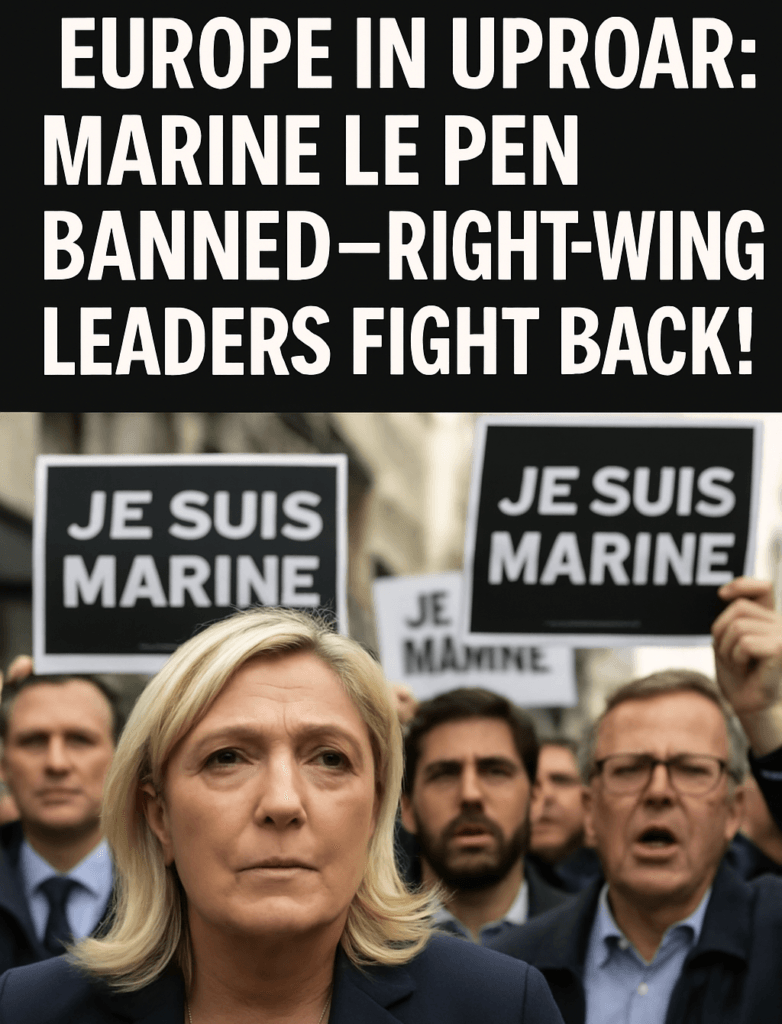The recent ban on Marine Le Pen has ignited a firestorm of reactions across Europe, particularly among right-wing politicians and supporters. Almost immediately after the announcement, the phrase “Je suis Marine” (“I am Marine”) began trending on social media, echoing past solidarity movements and symbolizing opposition to what many see as political suppression.

For Le Pen’s allies and nationalist movements across Europe, her exclusion represents more than just a political setback—it is seen as an alarming signal of growing restrictions on right-wing voices in European politics.
🔥 International Backlash from Right-Wing Leaders
Right-wing figures from various European nations have quickly condemned the decision as undemocratic, calling it an attempt to silence opposition ahead of crucial elections.
🇮🇹 Italy: Outrage from the Right-Wing Coalition
In Italy, members of Prime Minister Giorgia Meloni’s right-wing coalition have strongly criticized Le Pen’s ban, arguing that it undermines political pluralism.
🔹 Matteo Salvini, leader of the League party, called the ban “a clear effort to interfere in the democratic process.”
🔹 Italian conservatives warn that this move sets a dangerous precedent, where political rivals can be sidelined through bureaucracy rather than democratic debate.
🇩🇪 Germany: AfD Sees Parallels with Domestic Censorship
In Germany, the Alternative for Germany (AfD) party, which has also faced political and legal challenges, believes that Le Pen’s ban is part of a larger pattern of suppressing nationalist movements.
🔹 AfD leaders argue that “whenever the establishment feels threatened, they resort to censorship.”
🔹 They claim the decision erodes democracy rather than protecting it.
🇭🇺🇵🇱 Hungary & Poland: Calls for European Sovereignty
🔹 Hungary’s Prime Minister Viktor Orbán framed the ban as “an attack on national sovereignty” and an attempt to control European politics.
🔹 Poland’s nationalist Law and Justice (PiS) party fears that this could set a precedent for targeting other right-wing leaders in the future.
⚖️ A Threat to Democracy or a Justified Action?
Le Pen’s supporters argue that banning a major political figure is inherently undemocratic and violates principles of free speech and fair elections. They emphasize that Le Pen has consistently gained significant electoral support, proving she represents a legitimate political force.
Le Pen’s critics, however, argue that her exclusion is justified due to concerns over extremism and democratic violations. They claim that her rhetoric and policy proposals cross ethical or legal lines, making restrictions necessary.
However, some experts warn that such actions could backfire, fueling resentment and strengthening right-wing movements instead of weakening them.
📢 The “Je Suis Marine” Movement & Public Response
The phrase “Je suis Marine” has rapidly become a rallying cry among Le Pen’s supporters, mirroring past movements like “Je suis Charlie” after the Charlie Hebdo attacks.
🔹 Right-wing activists & politicians are using the hashtag #JeSuisMarine to protest the decision.
🔹 Protests have already begun in France, with Le Pen’s supporters demanding her reinstatement.
🔹 Some analysts suggest this controversy could boost Le Pen’s influence, portraying her as a political martyr.
🌍 Impact on European Politics
This controversy is expected to have long-term consequences for European politics.
✔️ Reinforces divisions between mainstream political elites and nationalist movements.
✔️ Right-wing parties may use Le Pen’s exclusion as a campaign issue in European Parliament elections.
✔️ Raises serious questions about democracy, political censorship, and fair elections.
🔹 Will this move energize nationalist movements?
🔹 Or will it mark the beginning of stricter regulations against right-wing leaders?
For now, one thing is certain: Marine Le Pen’s ban has not silenced the right—it has energized it.
❓ Frequently Asked Questions (FAQ)
1. Why was Marine Le Pen banned?
Le Pen was banned due to alleged violations of democratic norms and extremism concerns. However, her supporters argue that it was a politically motivated attack.
2. What does “Je suis Marine” mean?
It translates to “I am Marine”, symbolizing solidarity with Le Pen and opposition to political suppression.
3. How have European leaders reacted?
Right-wing leaders across Europe have condemned the decision, calling it a threat to democracy. Leaders in Italy, Germany, Hungary, and Poland have voiced strong objections.
4. Could this ban impact European elections?
Yes. Many believe it will fuel nationalist movements and become a major campaign issue for right-wing parties in the upcoming European Parliament elections.
5. What happens next?
It remains unclear. Le Pen’s supporters are protesting and challenging the ban, while the European political establishment may tighten regulations on nationalist movements.
This issue is far from over, and the debate over democracy, censorship, and political power in Europe is only growing. Will the European right-wing emerge stronger from this controversy? Time will tell.